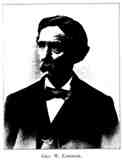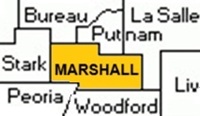
 George
George Washington EMERICK, deceased, was probably better known
for a time than any other person in the northern part of
Marshall county. He was a native of Pennsylvania, born in
Washington county, July 12, 1820. His parents both lived to an
advanced age, and both died on the old homestead where George
was born many years ago. An only daughter, Ellen, yet resides on
the place, which is near the village of Moundsville,
Pennsylvania. On that farm the boyhood and youth of George were
passed and he was given excellent educational advantages, which
wee improved, so much so, that while yet in his teens he was
enabled to teach the district schools, and it is said that his
first work, aside from that on his father’s farm, was as a
teacher in the public schools.
George
George Washington EMERICK, deceased, was probably better known
for a time than any other person in the northern part of
Marshall county. He was a native of Pennsylvania, born in
Washington county, July 12, 1820. His parents both lived to an
advanced age, and both died on the old homestead where George
was born many years ago. An only daughter, Ellen, yet resides on
the place, which is near the village of Moundsville,
Pennsylvania. On that farm the boyhood and youth of George were
passed and he was given excellent educational advantages, which
wee improved, so much so, that while yet in his teens he was
enabled to teach the district schools, and it is said that his
first work, aside from that on his father’s farm, was as a
teacher in the public schools.
Before leaving his native
state, Mr. EMERICK was united in marriage with Miss Cassie
BROWN, in August, 1847. By this union six children were born:
Minerva A., Emanuel B., Mary E., Margaret M., Frances Luella,
George W., all of whom are now deceased. Minerva A. married
Holmes MORRISON, and dying left one daughter, Mary MORRISON, who
is a most estimable young lady, yet residing in Henry. Emanuel
B. married Miss Anna Jennie MOODEY, a daughter of J. C. MOODEY.
He died, leaving one daughter, Anna May, better known as Bonnie
EMERICK, who also resides in Henry, and is a graduate of the
Henry high school class of 1896. None of the other children ever
married. In 1855 Mr. EMERICK determined on leaving his old home,
believing the west a better field for the industrious and
energetic man to succeed. Coming to Marshall county, he
purchased forty acres of land on section 18, Henry township,
which was the basis of his vast accumulations in after years. To
the original forty he added other tracts, and selling none, had
at the time of his death over one thousand acres, divided into
six farms, all of which he leased to other parties. Much of the
success attending him was due to his wife, who was a careful,
painstaking and economical woman. She died in 1877.
Some
two years after the death of his first wife, Mr. EMERICK married
Miss Emma MORRISON, and leasing his farm, removed to Henry,
where he embarked in the grocery trade, in which line of
business he was likewise quite successful. By this union there
was one child, Norman Clyde, now at home. Their married life was
of comparatively short duration, Mrs. EMERICK dying in 1884. Two
years later, in 1886, he married Miss Laura V. WOOD, who
survives him.
In early life Mr. EMERICK was converted and
united with the Methodist Episcopal church, with which he was
identified until his death, and in which he took a great
interest. For many years he was class leader of the class at
Snyder’s school house, which was located near his farm, and for
a time was superintendent of the Sunday school meeting at the
same place. On his removal to Henry he became an active worker
in the Methodist church of that place, and was interested in the
building of the house of worship, which was erected under the
pastorate of Rev. J. H. SCOTT. He greatly rejoiced in the
completion of the building, having contributed largely in time
and money to that end. He was a member of the building committee
and watched the erection of the building with an interest that
never flagged, and when finally turned over to the congregation
and duly dedicated to the service of Almighty God, he was indeed
happy. For twenty years he served on the board of trustees, and
for a still longer period was a class leader in the church. Over
forty years he had a name in the house of God and a fellowship
among his brethren, and his interest in the cause was
strengthened as the years went by. He was loyal to the faith as
he saw it, and his trust in the Heavenly Father was as a little
child. The Sunday school was ever dear to him, and he was
faithful in attendance as long as he was able regularly to
attend church.
The cause of temperance also found in him
a strong friend and a most earnest advocate. In fact, he was
keenly alive to all the moral and reform movements of the day.
His intellectual force was considerably above the average and he
thought and read much upon religion and temperance, and was
always ready to give a reason for the faith that was in him. A
man of strong will and determination, when once he decided upon
a course of action he held tenaciously to his opinions and
defended them against all who took issue with him. He was,
however, not a blind sectarian, but was broad in his estimate of
the good in others wherever they brought forth fruit. He
intensely desired to see the triumph of the cause of temperance
and believed that constitutional prohibition, both state and
national, was the most direct way of securing that end. For this
reason he identified himself with the prohibition party, and
always voted as he prayed.
George W. EMERICK was an
unpretentious man, of a quiet and retiring disposition, but when
aroused was full of force and energy, and none were at a loss
where to find him. Possessed of foresight and good calculation,
and withal a close manager, he succeeded in all his business
undertakings and at his death left a good property to his heirs.
In 1890 he became a sufferer from the grip, from which he never
fully recovered. Death came to his relief on the 16th of July,
1893, and the funeral services were held in the Methodist
Episcopal church in Henry, and were very largely attended by
sympathizing friends, many coming from a considerable distance.
The services were conducted by Rev. William Woolley, the pastor
of the church, assisted by Rev. J. H. SCOTT and Rev. E. E.
WASMUTH. Rev. SCOTT offered the prayer, Rev. WASMUTH read the
ninetieth Psalm as a Scripture lesson, and Rev. WOOLLEY preached
a brief sermon from the text, “For me to live is Christ, to die
is gain.” Following the discourse Mr. SCOTT paid a just tribute
to the memory of the deceased, whose connection with the church
as a Christian for forty years he emphasized, as also in his
official character while he was pastor. His remains were then
laid to rest in the Henry cemetery, there to wait the great
judgment day, when the dead in Christ shall be raised to meet
their Lord in the air and reign with Him throughout all
eternity. His monument stands at the head of the north avenue in
the cemetery. It is seventeen feet high and weighs twenty tons.
The design was selected by Mrs. EMERICK from designs exhibited
at the world’s fair, but was erected by a Henry firm, at a cost
of two thousand one hundred dollars.
In early life Mr.
EMERICK was a democrat and voted with that party until he saw
that, if in the providence of God any reform was to be obtained
it must come through some other source. For years he was an
auxiliary member of the Woman’s Christian Temperance Union and
the Young Woman’s Christian Temperance Union. He was a lover of
music, and in early life was a good vocalist and played the
violin, but in later years lost his interest in such matters.
His home was always open to the preachers.
Mrs. Laura V.
EMERICK, who survives her husband, is a woman of taste and
refinement, a Christian who delights in doing good, and by thus
doing serves her Master.
Extracted March 2011 by Norma Hass from The Biographical Record of Bureau, Marshall and Putnam Counties, Illinois, 1896.
| Bureau Putnam La Salle | |||
| Stark |
 |
||
| Peoria | Woodford | ||

